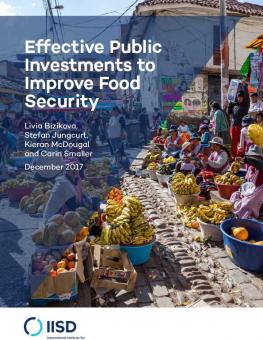
Effective Public Investments to Improve Food Security
The world has made significant progress in reducing hunger over the past decade. But hunger remains a major challenge. This policy brief identifies the most effective and efficient ways to invest in improving food security.
The world has made significant progress in reducing hunger over the past decade. But hunger remains a major challenge. This policy brief identifies the most effective and efficient ways to invest in improving food security.
It is derived from a longer peer-reviewed article entitled: Can interventions in the agricultural sector improve food security? A Systematic Review of Available Evidence.
A key message is that context matters. Where interventions had no or negative impacts on food security, the reason for failure was often the lack of consideration of broader community challenges, gender inequality and wealth inequity – whereas the successful interventions stressed the importance of prior analysis or a baseline assessment. Improved food security is often the result of multiple, well-designed interventions. The focus is less about finding the right intervention, and more about ensuring that interventions are designed and implemented with the particular context in mind. An important research gap exists regarding evidence on the efficiency of interventions relative to their costs.
You might also be interested in
Ending Hunger: What would it cost?
The International Institute for Sustainable Development and the International Food Policy Research Institute joined forces to estimate what it would cost to end hunger, and the contribution that donors need to make.
Adding Fuel to the Fire: How export restrictions can exacerbate climate change’s impacts on global food security
Higher temperatures will likely reduce agricultural yields and production in most countries, raising global food prices and worsening food security. Avoiding export restrictions is crucial.
Women Turning the Table on Food Loss and Waste in Kenya
A group of changemakers led a movement to tackle food loss and waste in Kenya. IISD experts have been working closely with local women leaders to make change happen.
Responsible Agricultural Practices of a Cocoa Buying Company in Ghana
This case study analyzes the extent to which a small cocoa trader in Ghana complies with international standards for responsible investment in agriculture.